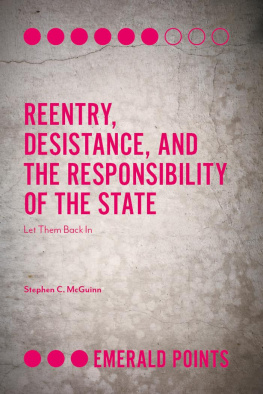
Cultures of Desistance
In contrast to the widespread focus on ethnicity in relation to engagement in offending, the question of whether or not processes associated with desistance that is the cessation and curtailment of offending behaviour vary by ethnicity has received less attention. This is despite known ethnic differences in factors identified as affecting disengagement from offending, such as employment, place of residence, religious affiliation and family structure, providing good reasons for believing differences would exist. This book seeks to address this oversight. Using data obtained from in-depth qualitative interviews it investigates the processes associated with desistance from crime among offenders drawn from some of the principal minority ethnic groups in the UK.
Cultures of Desistance explores how structural (families, friends, peer groups, employment, social capital) and cultural (religion, values, recognition) ethnic differences affected the environment in which their desistance took place. For Indians and Bangladeshis, desistance was characterised as a collective experience involving their families actively intervening in their lives. In contrast, Black and dual heritage offenders desistance was a much more individualistic endeavour. The book suggests a need for a research agenda and justice policy that are sensitive to desisters structural location, and for a wider culture that promotes and supports desisters efforts.
Adam Calverley is a lecturer in Criminology at the University of Hull, UK.
International Series on Desistance and Rehabilitation
General Editor
Stephen Farrall, University of Sheffield
Editorial Board
Ros Burnett, University of Oxford
Thomas LeBel, University of Wisconsin-Milwaukee, USA
Mark Halsey, Flinders University, Australia
Fergus McNeill, Glasgow University
Shadd Maruna, Queens University Belfast
Gwen Robinson, Sheffield University
Barry Godfrey, Liverpool University
- The Dynamics of Desistance
Charting pathways through change
Deidre Healy
- Criminal Behaviour in Context
Space, place and desistance from crime
Nick Flynn
- Cultures of Desistance
Rehabilitation, reintegration and ethnic minorities
Adam Calverley
First published 2013
by Routledge
2 Park Square, Milton Park, Abingdon, Oxon, OX14 4RN
Simultaneously published in the USA and Canada
by Routledge
711 Third Avenue, New York, NY 10017
Routledge is an imprint of the Taylor & Francis Group, an informa business
2013 Adam Calverley
The right of Adam Calverley to be identified as author of this work has been asserted by him in accordance with sections 77 and 78 of the Copyright, Designs and Patents Act 1988.
All rights reserved. No part of this book may be reprinted or reproduced or utilised in any form or by any electronic, mechanical, or other means, now known or hereafter invented, including photocopying and recording, or in any information storage or retrieval system, without permission in writing from the publishers.
Trademark notice: Product or corporate names may be trademarks or registered trademarks, and are used only for identification and explanation without intent to infringe.
British Library Cataloguing in Publication Data
A catalogue record for this book is available from the British Library
Library of Congress Cataloging in Publication Data
Calverley, Adam.
Cultures of desistance : rehabilitation, reintegration, and ethnic minorities / Adam Calverley.
p. cm.
Includes bibliographical references.
1. Assimilation (Sociology)--Great Britain. 2. Ethnic groups--Great Britain. 3. Recidivism--Great Britain. 4. Change (Psychology) I. Title.
JV6342.C35 2012 305.800941--dc23
2012007227
ISBN: 978 041567261 0 hbk
ISBN: 978 041562348 3 pbk
ISBN: 978 020310565 8 ebk
Typeset in Times New Roman by
Bookcraft Ltd, Stroud, Gloucestershire
Foreword
The International Series on Desistance and Rehabilitation aims to provide a forum for critical debate and discussion surrounding the topics of why people stop offending and how they can be more effectively reintegrated into the communities and societies from which they came. The books published in the series will be international in outlook, but tightly focused on the unique, specific contexts and processes associated with desistance, rehabilitation and reform. Each book in the series will stand as an attempt to advance knowledge or theorise about the topics at hand, rather than being merely an extended report of specific a research project. As such, it is anticipated that some of the books included in the series will be primarily theoretical, whilst others will be more tightly focused on the sorts of initiative that could be employed to encourage desistance. It is not our intention that books published in the series be limited to the contemporary period, as good studies of desistance, rehabilitation and reform undertaken by historians of crime are also welcome. In terms of authorship, we would welcome excellent PhD work, as well as contributions from more established academics and research teams. Most books are expected to be monographs, but edited collections are also encouraged.
Adam Calverleys book is a most welcome addition to the series. In it he explores the processes by which members of three of the UKs largest ethnic minorities desist from crime. From his studies, which he documents herein, he finds that, on the whole, the age old ingredients of employment, family formation, and motivations and hopes for a better future are present in the accounts he has elicited. However, the extent to which these resonate in the lives of the members of the different minority groups he has interviewed varies. This variance in the styles and nature of desistance is not just haphazard, however. Via a detailed examination of the socio-structural location of these minority groups and key aspects of their cultural and religious belief systems, Adam is able to show that these factors shape and mould the nature of desistance from crime by each of these groups. In many respects then, and certainly by my reading of his work, Adams study contributes greatly to our understanding of the ways that structural and cultural factors can affect processes associated with desistance from crime. It is all too hard to find ways of getting individuals to discuss the structural forces that influence and shape their decisions and life courses, as often they have only the vaguest of awareness of how such forces may operate in their lives. By exploring the desistance of ethnic minorities, Adam is better placed than many others to point to the influence of cultural and macro- and meso-level processes in such processes. This is a rich account and one that I recommend anyone interested in desistance reads and reflects upon.
Stephen Farrall,
Sheffield,
September 2011.
Acknowledgements
Discussions of desistance from crime, both in print and at academic conferences and presentations, repeatedly emphasise that desistance should be viewed as a process not an event. In fact, it has arguably become something of a mantra. If one reflects on what this means for more than a few minutes, the observation seems self-evident. That something as complex as the behavioural change required to go from being actively engaged in crime to successfully stopping offending, and more importantly ensuring that the stopping continues, involves more than just a one-off moment or occurrence, factor or incidents seems obvious. After all, when you think about it, what else in life that involves implementing change, achieving goals and/or accomplishments of one kind or another can actually be attributed to one event? Neither is it likely that an event that could be entirely isolated from the influence of other people or influences, nor separated from the social context where it occurs, could be identified. So, in many ways, the processes involved in endeavouring to move away from crime discussed in this study were also present in my long journey in trying to complete it. I could not have done it without the help of significant others, ready access to social capital, or the supportive values of others, without whom I may have never desisted. Thank you to Julia Willan, Nicola Hartley and Routledge Publishing for giving me this opportunity and ensuring that I did so.





